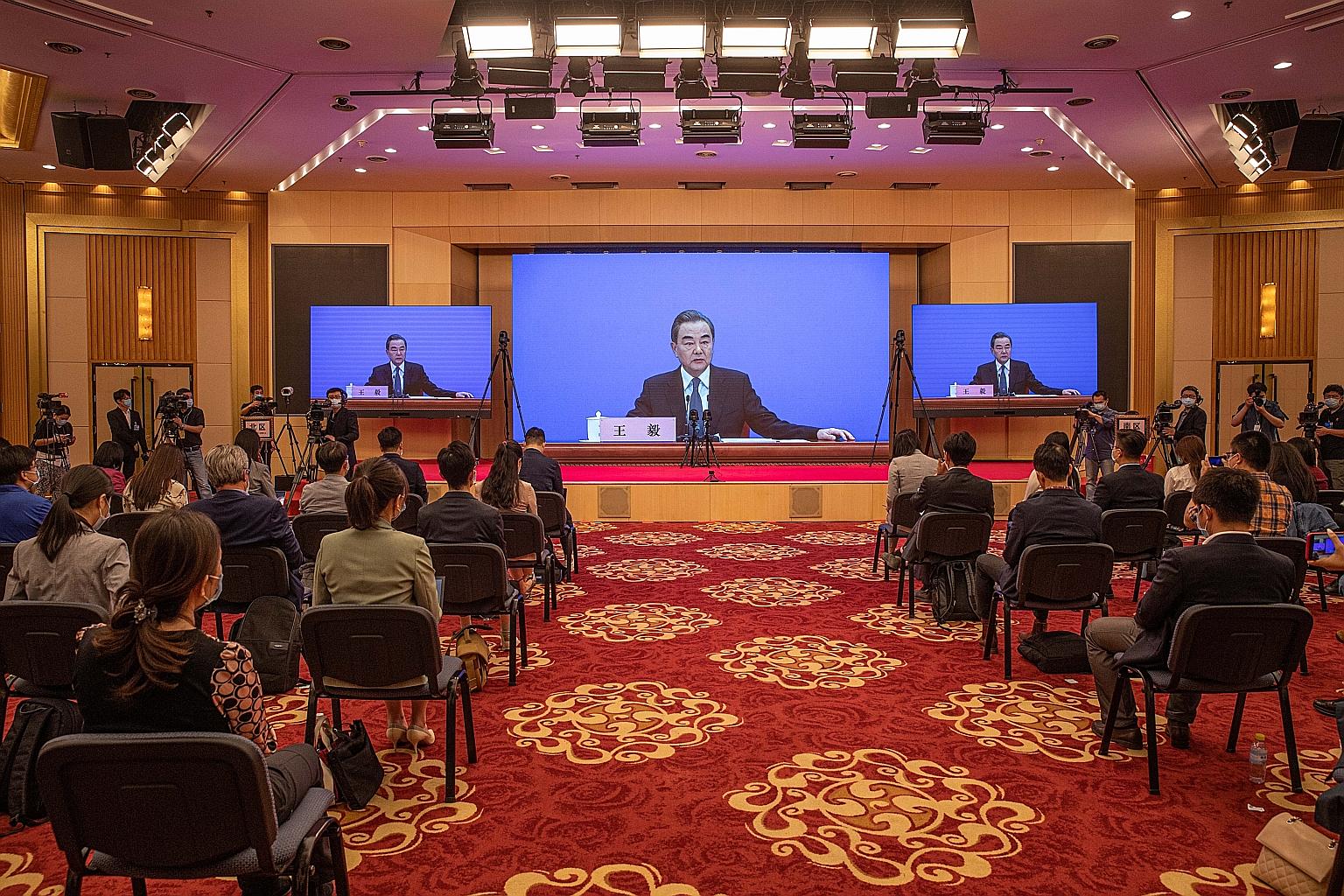Beijing says it's not using virus to advance claims in S. China Sea
Foreign Minister rebuts claims China is taking advantage of distraction caused by the pandemic to make its moves
Sign up now: Get insights on Asia's fast-moving developments

Chinese Foreign Minister Wang Yi speaking to reporters at a virtual briefing on the sidelines of China's legislative meetings in Beijing yesterday. Mr Wang said China has been working with Asean countries to beat the coronavirus, adding that ships and planes carrying medical supplies were sailing through and flying over the South China Sea even as he spoke.
PHOTO: EPA-EFE
China is not making use of Covid-19 to assert its dominance in the South China Sea, Foreign Minister Wang Yi said yesterday.
Rebutting claims that Beijing was taking advantage of the distraction caused by the pandemic in South-east Asia to make its moves, Mr Wang said China has been working with Asean countries to beat the coronavirus.
"There is nothing to support the claim that China is using Covid-19 to expand its presence in the South China Sea," said Mr Wang, speaking at an annual briefing on the sidelines of China's legislative meetings in Beijing.
Responding to a question by The Straits Times, Mr Wang said ships and planes carrying medical supplies were sailing through and flying over the South China Sea even as he spoke.
China has overlapping territorial claims with Brunei, Malaysia, the Philippines, Taiwan and Vietnam in the South China Sea.
United States Secretary of State Mike Pompeo warned Asean foreign ministers last month that China had moved to "take advantage of" the distraction of the pandemic to push its territorial ambitions in the South China Sea.
Some analysts have voiced similar views, though others argue that China's recent actions in the disputed waters follow its long-term strategy and may even have been planned before the outbreak.
Beijing recently ramped up activities in the contested waters, establishing two administrative districts on the Paracel and Spratly archipelagos last month and naming 80 islands, reefs, shoals and ridges, of which 55 are under water.
In a skirmish last month, Chinese coastguard vessels allegedly rammed and sunk a Vietnamese fishing vessel near the Paracel Islands, angering Vietnam.
The islands are claimed by both countries.
Soon after, a Chinese survey ship, accompanied by more than 10 vessels, shadowed an exploration craft contracted by Malaysian oil giant Petronas in waters within Malaysia's economic exclusion zone. There have also been Chinese encroachments in waters near the Natuna Islands, which prompted Indonesia to send warships and fighter jets to the area in January, forcing the boats to retreat.
The US has responded to Beijing's recent moves by increasing its patrols and exercises in the region. Australia also joined an American naval exercise near Malaysia.
Mr Wang said that China's cooperation with Asean contrasted with incursions by "non-regional" countries, which were "flexing their muscles" by sending military aircraft and vessels into the South China Sea.
"Their ill intentions and despicable moves are meant to sow discord between China and Asean countries and undermine the hard-won stability in the region," he added.
Dr William Choong, a senior fellow at ISEAS-Yusof Ishak Institute, said Chinese activities in the neighbouring waters have triggered unease across the region.
"China can say what it wants about the situation being stable, but there's concern that while China may call it business as usual in the South China Sea, it's coming at the expense of regional countries especially other disputant states," he said.
However, South-east Asian countries face a conundrum in their complex relationship with their sizeable neighbour.
"It's complicated. For smaller Asean countries, geostrategic and geopolitical considerations are important, but in the end, there are a lot of domestic imperatives to attend to, and China can help with those. And that's how China manipulates these smaller countries."
Beijing has been using economic benefits to win over countries in South-east Asia.
Meanwhile, talks on a code of conduct aimed at easing tensions in the disputed waters have been postponed because of the pandemic. Parties had hoped to sew up negotiations by the end of next year.
Mr Wang said Beijing was coordinating closely with Asean to "pick up negotiations where we left off as soon as possible".


